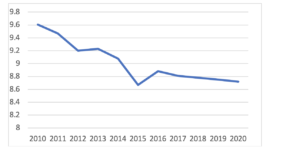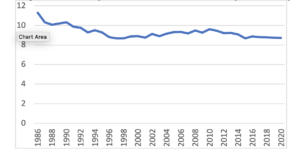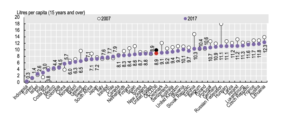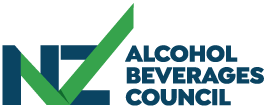Monday 5 July 2021
A recent review of 70 studies on alcohol education programmes targeted toward young people (15-24 years) has shown they can positively change alcohol-related behaviours, attitudes, and knowledge. [i] Key attributes of high-quality programmes include culturally and context-sensitive content, information about peer behaviours and social norms, taking an interactive approach, providing targeted age-appropriate information, and skills training to build resilience.
“The research shows 58% of the alcohol education programmes evaluated resulted in positive behaviour changes, and a further 17% impacted attitudes and/or knowledge. We know good education works – so it’s pleasing to see further research that supports the basic principle that education can make a difference toward reducing alcohol-related harm in young people and encouraging more responsible drinking behaviours in adults,” said NZ Alcohol Beverages Council Executive Director Bridget MacDonald.
“This aligns with industry research that shows 75% of Kiwis agree that targeted education and support programmes are the best way to reduce harmful drinking. Education has to role to play in supporting the generational shifts we see in better behaviours and attitudes toward alcohol,” says Bridget. [ii]
“Industry research also shows 88% of New Zealanders support alcohol education programmes in schools. This is why the industry supports the ‘Smashed’ theatre-in-schools education programme delivered by Life Education Trust, which aims to delay drinking in young people. Teenagers’ brains are still developing, so it’s best to delay introducing teens to alcohol for as long as possible. The programme uses interactive workshops to equip Year 9 students with the skills they need to resist peer pressure to drink alcohol and provides information so they can make informed and better decisions around alcohol and ideally not drink until they are adults,” says Bridget.
Bridget says the Smashed programme also shows that targeted education messaging can influence behaviours. Since 2019, over 35,000 students have engaged with the programme. As a result, research in 2019 showed 91% said they are less likely to drink alcohol before they turn 18 years old, and 84% said they felt better equipped to make the right choices about drinking alcohol. In its third year, Smashed provides a safe space for teens to explore relatable real-life issues and talk about peer pressure and alcohol, with 85% saying the programme was a good way to learn about the dangers of underage drinking.[iii]
“We also know parents are the biggest influence on a teen’s decisions and behaviours relating to alcohol. Cheers.org.nz is a good place for parents to find tips on how to have conversations about alcohol with their teens and how adults can be a good role model by drinking responsibly,” says Bridget.
“We are seeing the momentum for change in behaviours and attitudes toward alcohol in New Zealand through positive trends such as fewer younger people drinking, a general decline in hazardous drinking, overall consumption decreasing, and we consume less alcohol per capita than the OECD average. Kiwis are more mindful in choosing more no- and low-alcohol drinks to suit their lifestyle or social situation,” Bridget says. [iv] [v]
“We all have a part to play in reducing alcohol-related harm, and we need to take a pragmatic approach. Targeted education programmes are sensible solutions to helping educate young people on alcohol-related harm and encouraging adults to make better decisions around drinking. We also need targeted support initiatives to assist those who need it,” says Bridget.
ENDS
Need more information?
Check out cheers.org.nz and alcoholandme.org.nz for more information on what a standard drink is and how to make better drinking decisions.
A good rule of thumb is ‘Go no, low or slow’. It’s okay to choose no or low alcohol drinks. If you choose to drink, pace yourself and enjoy your drink slowly.
Ministry of Health/HPA Guidelines: Low-risk alcohol drinking advice to reduce your long-term health risks by drinking no more than:
– Two standard drinks a day for women and no more than 10 standard drinks a week,
– Three standard drinks a day for men and no more than 15 standard drinks a week,
– AND have at least two alcohol-free days every week.
Need help?
Call the Alcohol Drug Helpline on 0800 787 797, free txt 8681, or visit alcoholdrughelp.org.nz.
Research notes
[i] A systematic review of alcohol education programs for young people: do these programs change behavior? Hannah L M Calverley, Lauren A Petrass, Jennifer D Blitvich Health Education Research, Volume 36, Issue 1, February 2021, Pages 87–99, https://doi.org/10.1093/her/cyaa049 https://academic.oup.com/her/article/36/1/87/6031209
[ii] NZ Alcohol Beverages Council, New Zealander’s attitudes to alcohol research, December 2020, poll of 1000 New Zealanders undertaken by Curia Market Research
• 75% (+9% from 2019) agree targeted education and support programmes are the best way to reduce harmful drinking.
• Alcohol education programmes in schools: 88% strongly or somewhat support
• Targeted support programmes for harmful drinkers: 88% strongly or somewhat support
[iii] In 2019, a total of 20,463 young people took part in Smashed with 135 performances across 94 secondary schools. Student survey data evaluating the Smashed programme in 2019 showed:
• 95% understand the term ‘peer pressure’ after taking part in Smashed
• 91% said they are less likely to drink alcohol before they turn 18 years old and 84% said they felt better equipped to make the right choices about drinking alcohol (in 2020 this increased to 86%).
The programme was impacted by COVID-19 lockdowns and group size restrictions, however 10,574 students participated in the 2020 calendar year. Between 1 July 2020 and 30 June 2021, a total of 14,625 students have participated across 67 schools. The 2021 research to date shows:
• 85% felt Smashed was a good way to learn about the dangers of underage drinking (up from 79% in 2020, and 82% in 2019)
• 79% enjoyed the Smashed performance (up from 74% in 2020, and 79% in 2019).
[iv]Young people drinking less: Ministry of Health, NZ Health Survey 2019/20,
https://minhealthnz.shinyapps.io/nz-health-survey-2019-20-annual-data-explorer/_w_9c86555f/#!/explore-indicators
• 57.5% of people aged 15–17 years drank alcohol in the past year, compared with 75.5% in 2006/7.
• 85.2% of those 18–24 years drank alcohol in the past year compared with 89.1% in 2006/7.
Hazardous drinking declining in young people:
• Of those aged 15–17 years, 11.6% had consumed alcohol in a hazardous way in the previous year; it has decreased from 19.5% in 2006/07.
• Of those aged 18-24 years, 32.4% had consumed alcohol in a hazardous way in the previous year; this group has also seen an overall reduction over time, it has decreased from 43.2% (down 25%) since in 2006/07.
Decreasing alcohol consumption: StatsNZ Infoshare, Alcohol available for consumption to December 2020 (published 25 February 2021), http://archive.stats.govt.nz/infoshare/. Alcohol available for consumption has been trending downward for a number of years. Data shows alcohol available for consumption was 8.719 litres per head of population (15 years and older) in December 2020 and 9.607 litres in 2010, resulting in a 9.2% decrease (see graph 1 below). There has been a 15.4% decrease since 1990 when it was 10.316 litres, and a 22.7% decrease since 1986 when the data was first collected where there was 11.282 litres per head of population (15 years and older) in December 2020. Note: The per head of population (15 years and older) is the measure used by the OECD.
Graph 1. Litres of Alcohol Per Head of Population in New Zealand (Annual-December, aged 15 years and over) (published February 2021)
Source: Stats NZ Infoshare (February 2021)

Graph 2. Litres of Alcohol Per Head of Population in New Zealand (Annual-December 1986-2020, 15 years and over) Source: Stats NZ Infoshare (25 February 2021)

[iv] OECD Alcohol Consumption, https://data.oecd.org/healthrisk/alcohol-consumption.htm.
Alcohol consumption is defined as annual sales of pure alcohol in litres per person aged 15 years and older. The OECD average consumption is 8.9 litres/capita (aged 15 and over). New Zealand is at 8.8 litres/capita. See graph 3 below. Source: OECD Health Statistics, 2019. New Zealand figures as at 2018.
Graph 3. Recorded alcohol consumption among adults aged 15+, 2007 and 2017 (or nearest year) Source: OECD Health Statistics, 2019. New Zealand figures as at 2018.

